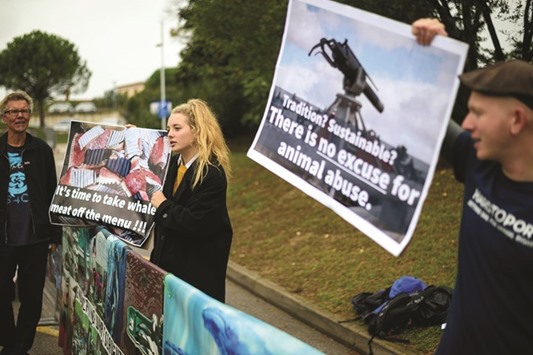Pro- and anti-whaling nations clashed at a key meeting yesterday where Japan sought to ease a 30-year-old moratorium on commercial hunts while others pushed for an Atlantic whale sanctuary.
Host Slovenia urged compromise the sake of the marine mammals – some species of which were hunted to near-extinction in the 20th century – but member states of the International whaling Commission (IWC) soon split into familiar factions.
Japan, which conducts a yearly whale hunt in the name of science, which its detractors say is for meat, insisted that stocks of some species have recovered sufficiently to make them fair game.
These included the southern hemisphere minke whale, Japan’s IWC commissioner Joji Morishita told journalists on the conference sidelines.
“Many species can actually stand a limited take,” Morishita said.
Japan’s yearly hunt is a recurring and deeply divisive issue at the 88-member IWC’s biennial gatherings.
The organisation’s 66th meeting, scheduled to run until Friday, opened in the Adriatic resort of Portoroz yesterday.
Scientific hunts are exempt under the IWC’s 1986 moratorium, but critics insist Japan abuses the provision.
The meat ends up on supermarket shelves and in restaurants, in line with an IWC stipulation that whales taken for science must be eaten.
“It is a loophole that the IWC never anticipated being routinely exploited by a country in order to kill whales for profit,” said Kitty Block of conservation group Humane Society International.
The International Court of Justice ruled in 2014 that Japan abused the scientific exemption.
Tokyo cancelled its 2014-15 hunt, only to resume it the following year, killing 333 minkes in the Southern Ocean – many of them pregnant, according to observers.
New Zealand and Australia want the IWC to introduce stringent reviews of scientific whaling projects.
“There are lots of methods that can be used, like acoustic tracking and satellite tagging and underwater listening stations, where you can conduct effective research without killing whales,” Australia’s Environment Minister Josh Frydenberg told AFP. “Global stocks have nowhere near recovered to where they were before the whaling period.”
Several other countries, including the EU bloc, urged Japan to stop its hunts, some accusing it of using the scientific exemption as “a licence to kill”.
Japan, in turn, opposes the creation of a South Atlantic whale sanctuary. This proposal by Argentina, Brazil, Gabon, South Africa and Uruguay has the backing of the European Union and others.
“Today ... there is a whale killing and catching in the (Southern Ocean), who may tell us that if a particular species begins to be depleted the whale catchers for science will not come to the South Atlantic?” Brazil’s IWC commissioner Hermano Ribeiro told AFP.
“We want to avoid that. It’s protection for today, protection for the future.”
Countries are to vote on the sanctuary, which has been on the IWC’s agenda for 15 years but voted down every time, this morning.
It requires 75% of the vote to pass.
Morishita highlighted the intractability of the divide.
“One side ... is supporting the total protection of whales under any circumstances, no kill, no one whale should be killed,” he said.
The other, “like Japan, is supporting sustainable utilisation of marine living resources including whales.
“These positions are so ... fundamentally different and that is causing the difficulties or stalemate or deadlock of this organisation. Unless we address this issue in some manner we will just be repeating the same thing, meeting after meeting.”
Besides Japan and communities which received aboriginal whaling licences from the IWC, Norway and Iceland conduct commercial hunts, having submitted objections to the moratorium.
This year’s meeting marks the 70th anniversary of the commission’s founding, and the 30th birthday of the moratorium estimated to have prevented the killing of tens – even hundreds – of thousands of whales.
Conservationists say the creatures still face a multitude of perils, from hunters and ship strikes to getting snared in fishing gear and pollution.
“(...) It is in the interests of all of us to give back to the cetaceans their living environment,” Slovene Environment Minister Irena Majcen urged delegates yesterday. “This is something that should unite us.”

Protesters hold up a placard reading ‘It’s time to take whale meat off the menu’ as they demonstrate during the 66th International Whaling Commission (IWC) meeting in Portoroz.
